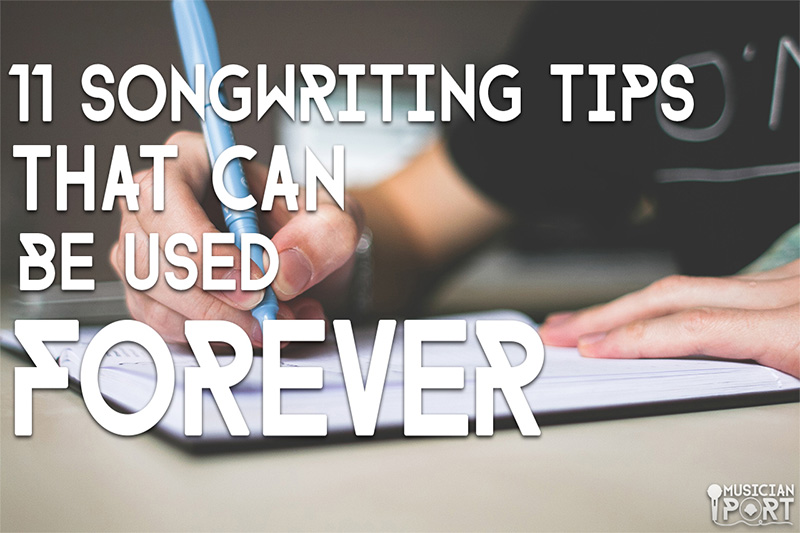Last updated on May 2nd, 2019 at 11:21 pm
Songwriting is one of the best ways to express yourselves through your music. It can be a very challenging process, but the feeling of putting together your own song is well worth it. As a songwriter for many years now, I’ve constructed a list of songwriting tips that I have gathered from my past experiences in the hopes of helping anyone who is just getting started or anyone who wants to improve their songwriting abilities.
Here are 11 songwriting tips that will help any aspiring songwriter.
Table of Contents
- 1 1. Finding Inspiration (In Everything)
- 2 2. Brainstorm your Song Ideas
- 3 3. Creating your Song Structure
- 4 4. Tell a Story when Songwriting
- 5 5. Start off Simple when Writing a Song
- 6 6. Collaborate with Others
- 7 7.Record Everything
- 8 8. Listen to Different Genres and Styles of Music
- 9 9. Experiment with Different Music Styles when Songwriting
- 10 10. Don’t be Afraid to take a Break
- 11 11. Just Keep Writing
- 12 Final Thoughts
- 13 More to Read:
1. Finding Inspiration (In Everything)
As a songwriter, I find myself searching for inspiration for my next song in my everyday life. It’s like I put on some special songwriting lens that has me constantly aware of how things can be interpreted into a song.
Whether it be a situation I find myself in or an event that is happening in my life, I have the mindset that a potential song can be pulled out of it.
I also try to interpret how certain situations make me feel both physically and emotionally.
The physical and emotional connection that I create with the different situations helps me find inspiration for songs that I can write.
You literally can find inspiration for writing a song in anything, whether it’s a complicated situation filled with conflict, or just going for a walk while sipping on some coffee.
Make sure to write down your ideas for inspirations somewhere because trust me, if you don’t, you’ll probably forget in a couple of hours.
Things you can find Inspiration from:
- Moments in your everyday lives
- Past Experiences
- Past, present, and future events
- Your family
- Books and people’s stories
- Movies, TV shows, and other forms of media
- Photographs
- Other people’s songs
This list can go on and on, but just remember that inspiration for writing songs can be found anywhere, sometimes you just have to be a little creative about it.
2. Brainstorm your Song Ideas
After gathering many different inspirations and ideas for a potential song, it’s time to start brainstorming your song ideas.
Brainstorming allows you to gather all of your ideas in one place so it’ll be easier to organize your thoughts, allowing you to build upon them.
Don’t be afraid to draw it out. Put together a visual map of all of your potential song ideas so you can visually see what you have to work with.
Once you have a visual point of view of the different song ideas you have come up with, you can break it down and see if certain ideas work well with each other or if some should be removed from your list.
After you have decided on the song idea you want to pursue, look back on the different inspirations that you have written down and fit them into the different categories of ideas.
Brainstorming in any creative field is a very necessary step that usually gets overlooked. Make sure to flush out all of your ideas to make the songwriting process easier for yourself. You’ll also be left with more ideas for future song projects.
Remember, you’ll never know which song idea will become your next biggest hit.
3. Creating your Song Structure
Once you have developed an idea for your next song, it is time to move on to the next stage of the songwriting process.
Establishing an idea for the structure of your song right at the beginning will aid you in the songwriting process. Keep in mind that the structure of your song may change throughout the process so don’t stress too much about it in the beginning.
The most basic song structure you can have is
Verse>Chorus>Verse>Chorus>Ending
You really want to focus on making the verses and the chorus sound as good as possible.
–The verses in your songs give the important details that you are trying to portray in your lyrics and music.
–The chorus in your songs summarizes the main message you are trying to share with your listeners.
Once you have your verses and chorus written, you can start playing around with the structure of your song. This is the time when you can start looking for ways to diversify your song and make it sound unique.
Putting together a good intro to your song can help set the tone right at the beginning. While the chorus is the main hook of your song, the intro is usually the first impression that you’ll have on your listener so it’s just as important as everything else.
You can also consider adding a pre-chorus right before the actual chorus. This adds some diversity to your song and creates a build up that helps leave more of an impact once you get to the chorus.
Adding a Bridge to your Song
One more thing you could add to your song structure is a bridge.
A bridge is usually in between a verse and a chorus and can be used to help the listener reflect on what was already said in the song. It can also be used to prepare the listener for the climax of the song.
In the bridge of a song, the chord progression, tempo, and even the style changes.
You should aim at making the bridge as different as possible from your verses and chorus while still complimenting them.
Think of it as if you were adding something new but meaningful to your song. Have a purpose for having a bridge.
When someone is listening to your song, they may lose their attention after hearing the verses and choruses. Having a bridge adds a refreshing new sound that grabs the attention of the listener in preparation for the finale of your song.
Your bridge can also be a good spot to have an instrumental highlight such as having a guitar solo or even adding a completely different instrument into the mix.
After you’ve completed your song, your song structure may look something like this:
Intro>Verse>Pre-Chorus>Chorus>Verse>Pre-Chorus 2>Chorus>Bridge>Final Chorus>Ending
Here are some last few things you can keep in mind while structuring your song:
- Change the words around for your pre-choruses so each pre-chorus has its own distinct sound
- Also, consider changing up the words of your choruses around
- Structure the song as if you were writing a story
- Changing the tempo in different sections of the song
4. Tell a Story when Songwriting

Photo on Visual hunt
Songwriting can be looked as a form of storytelling.
Whenever you are trying to tell a story, you want to make your message as clear as possible for the listener. This where the lyrics and music of your song come into play.
When writing your lyrics, think of how you can create an image in the listener’s mind while they’re listening to your song. Also, keep in mind how your lyrics can be written in a more creative way, instead of being upfront about your message. Give your listener the opportunity to interpret your song in their own way by not oversimplifying your lyrics.
Here’s an example:
If our song topic was about being heartbroken, there’s a simple approach to portraying this message and a creative and thought-provoking approach.
Simple Approach:
It’s been many days since we have spoken
Now that you’re gone, I’m heartbroken
Creative Approach:
The radio is playing our favorite song
And I can’t keep myself from singing along
The lyrics are still saved up on my phone
Looks like I’ll have to sing this duet alone
The simple approach is easy to understand and is straight to the point, but it doesn’t create that much imagery for the listener.
The creative approach still portrays the message of heartbreak, but it also adds a personal touch to it. It creates an image for the listener and sets up the story of your broken heart by introducing your experiences through your lyrics.
Overall it’s basically saying the same thing as the simple approach, but it adds more story development to your song.
The Theme of your Song
Every good story has some sort of theme or message that the writer is trying to portray.
Whatever theme you decide on for your song, make sure to make it clear to the listener and avoid any type of confusion.
These guidelines will help develop the theme for your listener:
- The details of the theme are explained throughout the verses of the song
- The chorus summarizes the main message you are trying to send to your listener
- Your song identifies the 5 W’s. Who, What, Where, When, and Why
- If a bridge is added, make sure that the bridge helps reflect upon what was previously said and reinforces the main message/theme of the song
- You can clearly identify your own theme of the song after listening to it
Having a clear theme for your song is very important, so make sure to keep these guidelines in mind when writing your lyrics.
For more tips on writing lyrics, check out our article on 10 Essential Tips for Writing Better Lyrics
5. Start off Simple when Writing a Song
Now that you have an idea of what goes on in the songwriting process, let’s talk about one of the most challenging stages of songwriting.
Finding where to start.
You’ve got all of these amazing ideas for your next song, but you have no clue on where to even start the songwriting process.
The one thing you should do is start your song off simple.
Overcomplicating your song, in the beginning, can make the entire process a complete headache. If you start off in a simple manner, you can always add and change things around later on as you continue writing your song.
Taking it easy allows you to get your creative juices going and reduces the chance of burning out.
Something I like to do is just playing around with some chord progressions and lyrics until I hear something that catches my attention. I do this with the theme in mind and try to go from there.
Once I find something that has potential, I write it down so I can have a set foundation for my song.
With this foundation, I’ll be able to get more of my ideas onto paper and develop a rough draft of what I want the song to sound like.
Having a rough draft of your song allows you to start adding different things to it. You could make it sound more technical, change the lyrics around, and even add more to the song structure.
It’s better to have a simple complete rough draft of the song you are writing than a flashy unfinished song that you have given up on because you burned yourself out.
6. Collaborate with Others
Collaborating while songwriting provides a whole new perspective that can help you enhance the song you are working on.
Just like the old saying says “Two heads are better than one.”
When we are putting together a new song, we may think that what we are writing is the best thing in the world. We can be pretty biased about how good our songs actually are.
That’s where collaborations come in. You can have a better, less biased opinion on how your current song project actually sounds.
Criticism can hurt, but don’t take it personally. Use the criticism you receive to improve your song so, in the end, you’ll have a song you can actually say you are proud of.
There are also more opportunities to generate better ideas for your song when working with another person(s). The ideas you come up with can be built upon by someone else which overall goes towards the end goal of completing your song.
Also, show your song to some of your non-musician friends to get an opinion from an ordinary listener’s point of view.
Collaborations can help you in your efforts of writing your own songs and also help you develop as a songwriter.
7.Record Everything
This is a very important tip for any songwriter.
Record everything!
I can’t tell you how many times I’ve regretted not recording my ideas down somewhere. Whether it be some lyrics that pop up in my head or a nice melody that I came up while I was jamming my guitar.
If you ever get a spark of creativity, be prepared and have something to record it. If you don’t, chances are, you’ll forget all about it in a couple of hours.
I always use my voice memo or notes app on my phone to record anything that I could potentially use in a song.
Not only will I be able to go back to it at a more convenient time, I will have an archive of useful ideas, lyrics, melodies, and potentially much more material that I can use in any future song projects.
So the next time you come across a creative idea, even if you aren’t in one of your songwriting sessions, be sure to record to it in some way. Relying on your memory might be one of your biggest mistakes.
8. Listen to Different Genres and Styles of Music
We all love listening to our favorite genres of music, but as a songwriter, it would be best to expose ourselves to different styles of music too.
When we listen to different genres and styles, it allows us to broaden our musical understanding.
The more types of music we expose ourselves to, the more inspiration and influences we’ll have as a songwriter that we can draw from.
For example, as a person who loves playing acoustic music, I have also found a love for hip hop/rap music. I see that my love for hip hop/rap influences how I write some of my songs. This helps me add more of a personal touch to my songs while also creating more of a unique sound.
Branch yourself out and start listening to genres you don’t normally listen to. Take note of how each style sounds similar and different and try and figure out how you can incorporate what you find in your songwriting.
Try to analyze the lyrics and writing styles of different artists to develop an idea of how they write their songs. Find what you enjoy listening too and what you don’t enjoy and see if you can add it to your own style.
You never know what a genre has to offer until you give it a chance, so always keep an open mind about different genres and listen to different types of music.
9. Experiment with Different Music Styles when Songwriting
Listening to different genres and styles of music is definitely beneficial for any songwriter, but now it’s time to implement them into your songwriting.
Start writing songs that are in different genres or styles from what you’re used to writing. This will help you broaden your skills as a songwriter.
Play around with different instruments that you normally wouldn’t add to your songs and see if you like the sound.
If you enjoy writing songs on the acoustic guitar, try to write a song with a piano accompaniment.
Collaborate with other musicians who play different genres and styles too.
All of this will increase your knowledge of different music styles, allowing you to have more to work with when songwriting.
10. Don’t be Afraid to take a Break

Just relax for a bit
It happens to every songwriter.
You want to keep pushing to finishing the current song we are working on because we know it’s going to be one of your biggest hits.
It’s been a couple of hours now and you’re still working hard, but your creative flow is starting to slow down. You then become frustrated and anything you try just doesn’t work like how you want it to.

Writing a song once you’re completely burnt out can lead to poor music decisions and overall, a poorly written song.
Instead of letting that happen, allow yourself for some time to take a breather.
Use this time to go outside, maybe spend some time with friends, or work on another project.
You can use your time away from you the current song you are working on to reflect on all of the work you have already done.
Relax your mind and body so when you do go back to writing that song, you’ll be in a better sense of mind to write and you’ll be able to use that creative brain of yours effectively.
11. Just Keep Writing
The more songs you write, the more you hone your songwriting abilities. You will be more comfortable writing songs while also developing your own style.
You will write a lot of bad songs, it’s inevitable, but you just have to keep writing. The more bad songs you write and cycle through the closer you’ll get to actually writing that song you can be proud of.
Like any skill, songwriting takes hard work, determination, and time to develop.
Don’t be so critical of yourself when writing your own songs. Constantly look at your work and see what can be improved.
Try to be a versatile songwriter and write songs about different topics, as well as in different styles.
Just keep writing songs. You’ll be surprised how much you can grow as a songwriter over time.
Final Thoughts
Well there you have it, 11 songwriting tips that will help you in your efforts of becoming a better songwriter.
Writing your own songs is one of the best ways for musicians to express themselves.
It’s a skill that isn’t mastered overnight and there’s no right or wrong way of approaching the songwriting process.
Hopefully, the tips that I have put together in this article will give you a foundation that you can work from as an aspiring songwriter.
Remember to keep writing and always keep an eye out for any types of ideas and inspirations for songs and always have an open mind to other music styles and genres.
Collaborate often so you can get outside input on your songs and don’t take any criticism personally.
Always work hard and best of luck on all of your future song projects.
Want to read more? Check out our article on 12 IMPORTANT Tips for Performing Live – THE ULTIMATE GUIDE













Leave a Comment